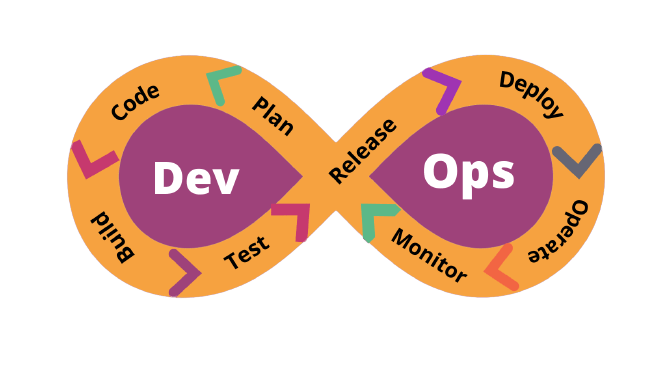Devops Foundation Program
If you are new to DevOps, this course will give you the basic information about DevOps, including key concepts and the terminologies.This course covers the DevOps Full Stack: People and Culture, Processes and Practices, Technology and Automation.
New Batch Starting In
TARGET AUDIENCES FOR DEVOPS ENGINEER
- Cloud Developers
- Cloud Software Engineers
- QA & Testing Professionals
- DevOps Professional
- System Administrators
- System Integrators
- IT Professionals
- System Engineers
- Release Managers

COURSE CURRICULUM
- Software Development Life Cycles (SDLC)
Waterfall Model - Agile Methodology
Scrum Model
Sprint/ Iteration - What is DevOps?
- Why DevOps?
- DevOps Importance
- DevOps Model
- DevOps Life cycle
- Market Trend an Career Scope for DevOps
- DevOps Tools
- Introduction of Linux Operation System
- Installing Pre-requisite Software’s (SSH Tools and FTP Tools) in Desktop/Laptop.
- Create an account in AWS.
- Create an EC2 Instance in AWS.
- Linux File/Directory structure.
- Linux Commands.
• Introduction
• What is Shell?
• Types of Shells
• What is Shell Scripting?
• First Shell Script program
• File Naming Conventions
• Comments
• Variables
• Command line Arguments
• Escape Characters
• String
• Arithmetic Operations
• User Interaction using read command
• Input and Output Redirection
• Control commands – if
• Control commands – for
• Control commands – while loop
• Control commands – Switch case
• Functions
• Pipe
- Elastic Compute Cloud (EC2)
o Introduction to Amazon EC2
o Launch Our First EC2 Instance – Part 1
o Launch Our First EC2 Instance – Part 2
o How to use Putty (Windows Users Only)
o Security Groups
o Volumes vs Snapshots
o EC2 Instance Meta-data
o EFS Service
o Summary of EC2 Section
o Amazon Machine Instance (AMI)
- Elastic Block Store (ELB)
o What is ELB and its uses
o ELB Policies and it’s benefits
o How to launch ELB with N nodes and other concepts on ELB. - Auto Scaling
- Elastic IP (EIP)
- Virtual Private Cloud (VPC)
o VPC Overview
o Building our own custom VPC
o Build A Custom VPC – Part 2
o Network Address Translation (NAT)
o Access Control Lists (ACLs)
o Custom VPC’s Direct Connect and it’s benefits and limitations - VPC Clean Up
- VPC Summary
- Simple Storage Service (S3)
o S3 Essentials
o Creating a S3 Bucket Using the Console
o S3 Storage Options and Types
o Create a S3 Website
o S3 Version Control
o Cross Region Replication
o S3 Lifecycle Management & Glacier
o Cloud Front Overview
o Create a CDN
o S3 – Security
o Snowball
o S3 Summary
o Elastic Volumes, Instance stores,
- Elastic Load Balancer (ELB)
- Identity Access Management (IAM)
o Introduction of IAM
o Users
o Groups
o Roles
o Policies
o Permissions
o Security Measures like MFA etc. - AWS CLI
- AWS Elastic IP
- Different segments SaaS, PaaS, and IaaS
- Azure Regions and Data Centres
- Understanding of Microsoft Azure portal
- Introduction to all Azure services
- Windows Azure Subscription
- Account Creation in GitHub/GitLab/BitBucket
- What is git?
- What is the VCS
- What is SCM?
- What is Branch
- What is Tag?
- Git Administration.
- Git commands
- Working with git as a Developer perspective
- SSH Key generation
- PAT creation
- Cloning Repositories
- Merging Branches
- Pull Requests
- Cloning Remote Repo
- Forking Repo
- Branching strategy
- Best practices for Releases/Code commits in any VCS
- Terraform Installation
- Terraform Architecture
- Docker and Kubernetes Installation and Configuration
- Kubernetes Introduction
- Architecture
- Kubernetes Cluster (Self-Managed) Setup Using Kubeadm.

FAQ
DevOps certified professionals who are working in a real-time environment are designated as DevOps Engineers. The main area of focus for DevOps engineer is to maintain a seamless communication between the development and operational side of an organization. They follow the principles of continuous development, continuous testing, continuous integration, continuous deployment and continuous monitoring to make sure that the product gains maximum profitability.
As per Payscale, the average salary of a DevOps professional is $96,418 in the United States.
You can choose either of the two options: View the recorded session of the class available OR You can attend the missed session, in any other live batch.
Basic knowledge of Linux or scripting is good to have. For this, we provide you with a free Linux training course to help speed up your learning.
Prior IT experience would be necessary for learning this technology.
Yes, a person without IT experience can enter DevOps. However, having coding and programming knowledge is highly recommended for effective learning.


